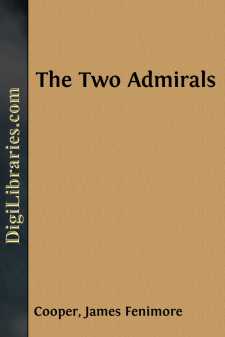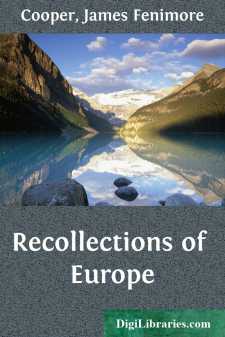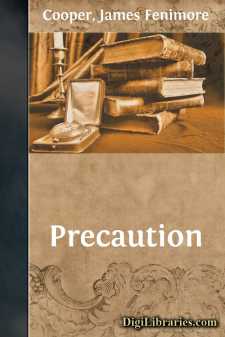Categories
- Antiques & Collectibles 13
- Architecture 36
- Art 48
- Bibles 22
- Biography & Autobiography 813
- Body, Mind & Spirit 138
- Business & Economics 28
- Children's Books 12
- Children's Fiction 9
- Computers 4
- Cooking 94
- Crafts & Hobbies 4
- Drama 346
- Education 46
- Family & Relationships 57
- Fiction 11821
- Games 19
- Gardening 17
- Health & Fitness 34
- History 1377
- House & Home 1
- Humor 147
- Juvenile Fiction 1873
- Juvenile Nonfiction 202
- Language Arts & Disciplines 88
- Law 16
- Literary Collections 686
- Literary Criticism 179
- Mathematics 13
- Medical 41
- Music 40
- Nature 179
- Non-Classifiable 1768
- Performing Arts 7
- Periodicals 1453
- Philosophy 64
- Photography 2
- Poetry 896
- Political Science 203
- Psychology 42
- Reference 154
- Religion 505
- Science 126
- Self-Help 81
- Social Science 81
- Sports & Recreation 34
- Study Aids 3
- Technology & Engineering 59
- Transportation 23
- Travel 463
- True Crime 29
James Fenimore Cooper
James Fenimore Cooper was a 19th-century American writer best known for his historical novels set on the American frontier. His most famous work, "The Last of the Mohicans," is part of the "Leatherstocking Tales" series, which follows the adventures of Natty Bumppo, a resourceful frontiersman. Cooper's writing significantly contributed to the development of American literature, highlighting themes of wilderness, native peoples, and the conflict between civilization and nature.
Author's Books:
Sort by:
It is a strong proof of the diffusive tendency of every thing in this country, that America never yet collected a fleet. Nothing is wanting to this display of power but the will. But a fleet requires only one commander, and a feeling is fast spreading in the country that we ought to be all commanders; unless the spirit of unconstitutional innovation, and usurpation, that is now so prevalent, at...
more...
Chapter I. --"But I'll not chide thee;Let shame come when it will, I do not call it;I do not bid the thunder-bearer shoot,Nor tell tales of thee to high-judging Jove;Mend when thou canst--" Lear. It is almost as impossible to describe minutely what occurred on the boat's reaching the Wallingford, as to describe all the terrific incidents of the struggle between Drewett and myself in...
more...
PREFACE. It may seem to be late in the day to give an account of the more ordinary characteristics of Europe. But the mass of all nations can form their opinions of others through the medium of testimony only; and as no two travellers see precisely the same things, or, when seen, view them with precisely the same eyes, this is a species of writing, after all, that is not likely to pall, or cease to be...
more...
W. C. Bryant's Discourse on the Life, Genius, and Writings of James Fenimore Cooper, Delivered at Metropolitan Hall, N.Y., February 25, 1852. It is now somewhat more than a year, since the friends of James Fenimore Cooper, in this city; were planning to give a public dinner to his honor. It was intended as an expression both of the regard they bore him personally, and of the pride they took in the...
more...
The writer has published so much truth which the world has insisted was fiction, and so much fiction which has been received as truth, that, in the present instance, he is resolved to say nothing on the subject. Each of his readers is at liberty to believe just as much, or as little, of the matter here laid before him, or her, as may suit his, or her notions, prejudices, knowledge of the world, or...
more...
CHAPTER I. The turf shall be my fragrant shrine;My temple, Lord! that arch of thine;My censer's breath the mountain airs,And silent thoughts my only prayers.MOORE The sublimity connected with vastness is familiar to every eye. The most abstruse, the most far-reaching, perhaps the most chastened of the poet's thoughts, crowd on the imagination as he gazes into the depths of the illimitable...
more...
INTRODUCTION. It is not improbable that some of those who read this book, may feel a wish to know in what manner I became possessed of the manuscript. Such a desire is too just and natural to be thwarted, and the tale shall be told as briefly as possible. During the summer of 1828, while travelling among those valleys of Switzerland which lie between the two great ranges of the Alps, and in which both...
more...
Chapter I."There is a pleasure in the pathless woods,There is a rapture on the lonely shore.There is society where none intrudes,By the deep sea, and music in its roar:I love not man the less, but nature more,From these our interviews, in which I stealFrom all I may be, or have been before,To mingle with the universe, and feelWhat I can ne'er express, yet cannot all conceal" Childe Harold....
more...
Chapter I. ----"When that's goneHe shall drink naught but brine." Tempest. While there is less of that high polish in America that is obtained by long intercourse with the great world, than is to be found in nearly every European country, there is much less positive rusticity also. There, the extremes of society are widely separated, repelling rather than attracting each other; while among...
more...
Chapter I. "'Twas a commodity lay fretting by you; 'Twill bring you gain, or perish on the seas." Taming of the Shrew. There is nothing in which American Liberty, not always as much restrained as it might be, has manifested a more decided tendency to run riot, than in the use of names. As for Christian names, the Heathen Mythology, the Bible, Ancient History, and all the classics,...
more...











